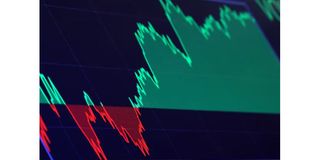US stocks set for upbeat open on Trump's tariff reprieve for some electronics

A screen displays charts the Dow Jones Industrial Average after the closing bell on the floor at the New York Stock Exchange (NYSE) in New York City, U.S., April 11, 2025. PHOTO|REUTERS
What you need to know:
- The U.S. unveiled the exemptions on Friday, but President Donald Trump said he would announce tariff rates for imported semiconductors later in the week.
Wall Street's main indexes were on track to jump at the open on Monday, with most tech stocks rising before the bell after the White House exempted smartphones and computers from new tariffs on China, although further semiconductor levies remain imminent.
The U.S. unveiled the exemptions on Friday, but President Donald Trump said he would announce tariff rates for imported semiconductors later in the week.
The exempted tech products will face new duties within the next two months, U.S. Commerce Secretary Howard Lutnick said. These product categories make up about 20% of U.S. imports from China, according to Deutsche Bank.
Still, tech stocks jumped, with Apple rising 6.4% in premarket trading.
Chip stocks also gained, with Nvidia adding 3.1% and Micron Technology up 6.2%. PC maker HP jumped 5.1% and retailer Best Buy soared 11.2%.
The exemptions would ease some pressures on the cost of consumer goods, notably on Apple products that would have become "un-sellable" if tariffs went into effect, said Kim Forrest, chief investment officer at Bokeh Capital Partners,
"It feels as if the Trump administration is responding to consumer pressure and that the kind of huge tariffs that have been placed on China might be walked back as well once negotiations begin," Forrest said.
The exemptions were the latest change to Trump's tariff policies that have roiled global markets as investors, consumers and companies question the impact on economic growth and inflation.
At 08:31 a.m., Dow E-minis were up 377 points, or 0.93%, S&P 500 E-minis were up 76.75 points, or 1.42%, and Nasdaq 100 E-minis were up 330.25 points, or 1.76%.
Last week's imposition of some reciprocal tariffs followed by a pause - and then an escalation in trade tensions between the U.S. and China - triggered the wildest swings on Wall Street since the 2020 COVID-19 pandemic.
After slumping earlier in the week, the S&P 500 notched its biggest weekly gain on Friday since November 2023, but the index has dropped 5.4% since April 2's "Liberation Day" tariff announcement.
The CBOE Volatility Index considered Wall Street's fear gauge, eased from eight-month highs hit last week and was last at 33.05.
Step chart showing the rising tariff rates imposed by the U.S. and China against each other since February 1.
With markets closed on Good Friday, the shorter trading week ahead will be scrutinized for signs on how policymakers, businesses and consumers assess the economic outlook amid so much policy uncertainty.
Goldman Sachs' shares rose 2.8% after the bank reported higher first-quarter profit, fueled by record revenue from equities trading.
Johnson & Johnson and Netflix are among companies that will report results later in the week.
Citigroup downgraded U.S. equities to "neutral" from "overweight" on expectations that sweeping tariffs would hit earnings growth in the region.
A New York Federal Reserve survey, due later in the day, will also be watched for changing consumer expectations after survey data on Friday showed a sharp slump in sentiment, along with inflation expectations at their highest level since 1981.
Several Fed officials, including Governor Christopher Waller, are slated to speak later on Monday.
Investors will also be on watch for commentary from U.S. Federal Reserve Chair Jerome Powell and the retail sales data for March, both expected on Wednesday.





